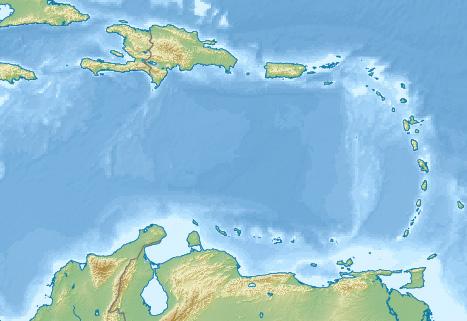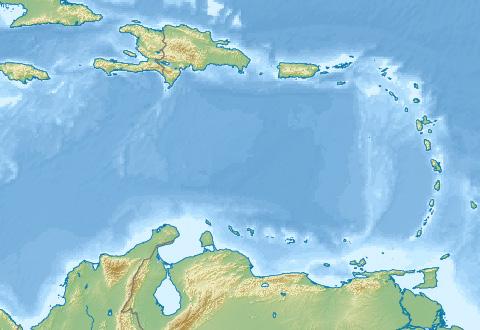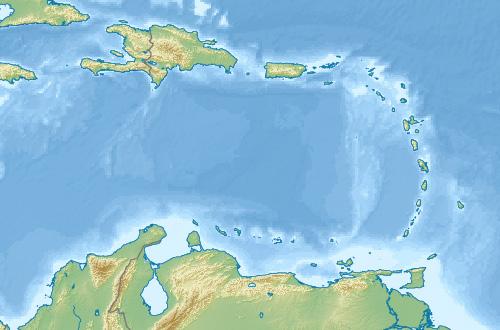




The Economic Commission for Latin America and the Caribbean (ECLAC) is one of five regional commissions of the United Nations Economic and Social Council (ECOSOC). It was established in 1948 to support Latin American governments in the economic and social development of that region. Subsequently, in 1966, the Commission (ECLA, at that time) established the subregional headquarters for the Caribbean in Port of Spain to serve all countries of the insular Caribbean, as well as Belize, Guyana and Suriname, making it the largest United Nations body in the subregion.
At its sixteenth session in 1975, the Commission agreed to create the Caribbean Development and Cooperation Committee (CDCC) as a permanent subsidiary body, which would function within the ECLA structure to promote development cooperation among Caribbean countries. Secretariat services to the CDCC would be provided by the subregional headquarters for the Caribbean. Nine years later, the Commission’s widened role was officially acknowledged when the Economic Commission for Latin America (ECLA) modified its title to the Economic Commission for Latin America and the Caribbean (ECLAC).
The ECLAC subregional headquarters for the Caribbean (ECLAC/CDCC secretariat) functions as a subregional think-tank and facilitates increased contact and cooperation among its membership. Complementing the ECLAC/CDCC work programme framework, are the broader directives issued by the United Nations General Assembly when in session, which constitute the Organisation’s mandate. At present, the overarching articulation of this mandate is the United Nations Sustainable Development Goals.
Towards meeting these objectives, the Secretariat conducts research; provides technical advice to governments upon request; organizes intergovernmental and expert group meetings; helps to formulate and articulate a regional perspective within global forums; and introduces global concerns at the regional and subregional levels.
Areas of specialization include trade, statistics, social development, science and technology, and sustainable development, while actual operational activities extend to economic and development planning, demography, economic surveys, assessment of the socio-economic impacts of natural disasters, climate change, data collection and analysis, training, and assistance with the management of national economies.
The ECLAC subregional headquarters for the Caribbean also functions as the Secretariat for coordinating the implementation of the Programme of Action for the Sustainable Development of Small Island Developing States. The scope of ECLAC/CDCC activities is documented in the wide range of publications produced by the subregional headquarters in Port of Spain.
MEMBER COUNTRIES
Antigua and Barbuda
The Bahamas
Barbados
Belize
Cuba
Dominica
Dominican Republic
Grenada
Guyana
Haiti
Jamaica
Saint Kitts and Nevis
Saint Lucia
Saint Vincent and the Grenadines
Suriname
Trinidad and Tobago
Anguilla
Aruba
Bermuda
British Virgin Islands
Cayman Islands
Curaçao
Guadeloupe
Martinique
Montserrat
Puerto Rico
Sint Maarten
Turks and Caicos Islands
United States Virgin Islands
Director’s Desk:
Artificial intelligence for Caribbean sustainable development
Toward AI Policies for the Caribbean
AI Governance for the Caribbean
“It’s messy, but we have to do it now” – Craig Ramlal, UN advisor, on AI regulation
Regular Features
Recent
A Note on this issue of the FOCUS
The illustrations used in this issue of the Focus were generated using Artificial Intelligence.
COVER SOURCE: Adobe Stock
PROMPT: Hands of a African Caribbean child holding crystal glowing globe, planet Earth at a sunny green meadow background, copyspace, taking care Ecology, sustainable nature, conversation concept
PAGE 4
SOURCE: Adobe Firefly
PROMPT: Woman working in a futuristic office sci fi style
PAGE 6
SOURCE: Adobe Stock
PROMPT: Globe in robot hand with icon on nature background,

FOCUS: ECLAC in the Caribbean is a publication of the Economic Commission for Latin America and the Caribbean (ECLAC) subregional headquarters for the Caribbean/Caribbean Development and Cooperation Committee (CDCC).
EDITORIAL TEAM:
Director Diane Quarless
Editor Jabari Fraser
Copy Editor Denise Balgobin
Coordinator Dale Alexander
Proof Reader Veera Deokiesingh-Fraser
Design and Layout Liseanne Martin-Subero
CONNECT WITH US FOR MORE:

Produced by ECLAC
CONTACT INFORMATION
ECLAC Subregional Headquarters for the Caribbean
PO Box 1113, Port of Spain, Trinidad and Tobago
Tel: (868) 224-8000
E-mail: spou-pos@eclac.org
Website: www.eclac.org/portofspain

AI holds immense potential for the Caribbean, but its deployment and use must be managed responsibly, based on established values and goals, while ensuring the protection of human rights. Discussions on the ethics of AI have been ongoing at the international level, and in 2019 led to the adoption of the UNESCO Recommendation on the Ethics of Artificial Intelligence. Work to implement the Recommendation is now underway, including in the Caribbean. In the first article of this issue, colleagues from UNESCO discuss best practices related to AI policy, present the Caribbean AI Policy Roadmap, and invite you to provide comments on the draft document.
AI systems could support the achievement of many of the targets of the 2030 Agenda for Sustainable Development, and its Sustainable Development Goals, but could also inhibit the achievement of
2023 saw Artificial Intelligence (AI) tools becoming widely available to the general public, leading to the generation of new works of art, songs, text, and computer code. This explosion in new outputs has led to much excitement around AI’s potential, but also brought to the forefront concerns about countries and communities being left behind, and the technology’s potential to harm individuals and societies. This issue of FOCUS magazine discusses the potential impact of AI on the Caribbean, and avenues to develop tailored AI policies, governance systems, and to engage with AI issues at the international level.
others. Regulatory oversight is essential to ensure that AI can support sustainable development and contribute to greater equity and inclusion. In the second article, two lawyers provide an overview of action to govern AI in the Caribbean, discuss Caribbean AI governance challenges, and share some potential pathways forward for the subregion.
As noted in the Secretary-General’s Roadmap for Digital Cooperation, there has been a lack of “representativeness and inclusiveness in global discussions”, and of overall coordination on AI. To counteract this trend, a 32-member High-level Advisory Body on Artificial Intelligence was formed in October 2023 by the United Nations Secretary-General. The Body will help bridge existing and emerging initiatives on AI governance, and provide recommendations by summer 2024. The final article of this issue consists of an interview with Dr. Craig Ramlal, a national
of Trinidad and Tobago and lecturer at the University of the West Indies. The interview addresses the most exciting opportunities for AI use in the Caribbean, the potential impact, and critical policy actions that need to be taken.
Artificial intelligence is already having an impact on the Caribbean region, and Caribbean countries are eager to participate in discussions about it, learn about the technology’s potential, and find ways to regulate it for the greater good. This issue of FOCUS will provide some insight into both current efforts and future prospects.



2023 has been a watershed year for Artificial Intelligence. Generative AI¹ has captured the public’s attention due to its user-friendliness and the wide range of practical uses it has opened for non-techies. Earlier this year, ChatGPT set a record by becoming the first application to reach a monthly user base of 100 million people in just two months. In early November 2023, OpenAI, the developers of ChatGPT, announced that 2 million developers and over 92% of US Fortune 500 companies were using the platform.2
The capabilities and availability of AI systems has provoked a range of reactions. While some educators are enthusiastic about its potential to support learning, others are concerned it might circumvent learning opportunities or contribute to misinformation.3 At Inspire, Microsoft’s annual developer conference, Satya Nadella, Microsoft's CEO, spoke enthusiastically of AI as the most significant platform shift and market expansion in computing history, enabling organizations and individuals
Artificial Intelligence offers extraordinary opportunities for accelerating human progress across a range of fields from healthcare and education, to combating climate change and disasters. However, if left unregulated, AI could exacerbate inequalities, undermine human rights and threaten peace.
to do more.4 There is much speculation about the impact of AI on jobs. Some believe AI will degrade “good” jobs into poorly paid “bad” ones. Yet others see AI as an inevitable development, so they call for regulations on the pace of AI’s entry into the workplace, as well as retraining for displaced employees to find new jobs and reduce workforce disruptions.5 On the other hand, some believe AI will eliminate monotonous, dangerous and repetitive work. This would enable workers to increase the time they can spend on more interesting aspects of work, enabling them to be more creative, productive and find greater work satisfaction.6
At the international policy level there is consensus that AI must be used responsibly and ethically to advance human rights, peace and prosperity789 . Algorithms, for example, can replicate or embed biases that exist in our societies, exacerbating different forms of discrimination and inequalities. In order to uphold human rights and address ethical concerns of AI, in 2021, UNESCO’s 193 Member
1 Generative AI describes algorithms that can be used to create new content, including text, audio, images or video.
2 OpenAI’s ChatGPT now has 100 million weekly active users. https://tcrn.ch/3FOwJCO
3 ChatGPT in education: global reactions to AI innovations https://www.nature.com/articles/s41598-023-42227-6
4 Microsoft Inspire https://news.microsoft.com/inspire-2023/
States unanimously adopted the Recommendation on the Ethics of Artificial Intelligence, the world’s first global standard on AI ethics.10 The Recommendation represents a unique agreement of Member States on the values, principles and policies that should govern the development of AI. Furthermore, it acts as an ethical guiding compass providing concrete pathways to maximize the positive impact of AI, while addressing the associated risks. UNESCO is rolling out policy tools to support countries in effectively applying the recommendations.
The Caribbean region is at a pivotal juncture, facing developmental challenges such as the need to modernize its institutions, infrastructure, and systems across various sectors. AI presents a transformative opportunity for inclusive, social, and economic growth. To harness AI's potential effectively, Caribbean nations need to formulate policies and safeguards to mitigate against the negative impacts of AI.

5 AI won’t kill our jobs — but it will make them worse https://www.washingtonpost.com/made-by-history/2023/06/19/ai-chatgpt-jobs-unions/
6 How Does Artificial Intelligence Create New Jobs? https://www.forbes.com/sites/forbesbusinesscouncil/2023/07/26/how-does-artificial-intelligence-create-newjobs/?sh=43e24fc52586
7 Stressing Artificial Intelligence Could Power Extraordinary Progress for Humanity, Secretary-General Says New High-Level Advisory Body ‘Is the Starting Point’ https:// press.un.org/en/2023/sgsm22007.doc.htm
8 The Bletchley Declaration by Countries Attending the AI Safety Summit, 1-2 November 2023 https://www.gov.uk/government/publications/ai-safety-summit-2023-thebletchley-declaration/the-bletchley-declaration-by-countries-attending-the-ai-safety-summit-1-2-november-2023
9 Forum on the Ethics of Artificial Intelligence In Latin America and the Caribbean https://foroialac.org/en/
10 Ethics of Artificial Intelligence https://www.unesco.org/en/artificial-intelligence/recommendation-ethics
A key strategy for Caribbean Small Island Developing States (SIDS) is the development of a multi-disciplinary, multi-stakeholder approach. This strategy should focus not only on deploying AI technologies but also on building digital infrastructure, enhancing human capacity and creating an enabling regulatory framework. UNESCO's proactive approach to AI's global impact and its potential for positive outcomes provides valuable guidance.
AI can address specific structural challenges in the Caribbean, such as limited resources, small markets, and climate change vulnerability. Nonetheless, the increased use of AI could disrupt local labour markets, affecting employment and livelihoods. Limited capabilities and resources create noticeable disparities in Caribbean countries' access to and development of frontier technologies. This highlights the need for building and enhancing human capacity, as well as creating people-centered regulatory frameworks. These frameworks must ensure fair access to AI's benefits, through an ethical lens, particularly for vulnerable populations, to prevent exacerbating inequalities and ensure that no one is left behind.
With the future of AI here, how can the Caribbean leverage transformative technologies to cope with developmental challenges when AI frameworks, policies and strategies are not yet in place? The answer perhaps lies in drawing on the strength of the region’s resilience and focusing it on AI for growth. Although AI frameworks and laws are still in their infancy, much can be garnered by leveraging the expertise of experts and collaborators. Tools such as UNESCO’s Readiness Assessment Methodology and Ethical Impact Assessment elaborated to render operational the Recommendation on the Ethics of AI, as well as the UN Secretary General’s Roadmap for Digital Cooperation, Guidelines for Regulating Digital Platforms and Digital Capacity
Building for Civil Servants, are freely available references that can assist with shaping AI policies for the Caribbean. The process to create a Caribbean AI Policy Roadmap began in 2020 under the Caribbean AI Initiative. It was initiated by the Broadcasting Commission of Jamaica, working in close collaboration with the UNESCO Cluster Office for the Caribbean, within the framework of the UNESCO Information for All Programme (IFAP). Under the Caribbean AI Initiative, broad consultative multistakeholder events were convened over the period December 2020 to September 2021. The process engaged stakeholders from the private sector, governments, academia, NGOs and the general public. The views of women, youth and persons with disabilities were specifically included. The resulting contributions became the Draft Caribbean AI Policy Roadmap. The Roadmap aims to raise awareness, promote reflection and stimulate policy action to harness the opportunities and address the challenges that AI and frontier technologies pose to the region. In early 2023 the Caribbean AI Policy Roadmap was updated to take into account:
• The post-COVID-19 context,
• New and emerging regulatory landscape with frameworks and tools such as UNESCO’s Recommendation on the Ethics of Artificial Intelligence, and the European Union’s AI Act;
• Increased ethical concerns as AI plays a bigger role in supporting decisionmaking across different sectors;
• The widespread public adoption of large language models (LLMs), like ChatGPT, which have captured the public’s imagination;
• Efforts by Caribbean states to leverage digital transformation in their sustainable development strategies;
• Renewed calls for digital technologies to be harnessed to accelerate sustainable
development, including in the United Nations Secretary-General’s Roadmap on Digital Cooperation; and
• A desire to have an even broader range of Caribbean stakeholders engaged in the consultative process to ensure full regional ownership of the Roadmap.
The revised Roadmap has been presented at several interactive national and regional forums. The Roadmap is structured around four pillars (see below) that emerged from the stakeholder consultation process. The pillars provide strategic direction and guide policy development:
1. Governance & Transformation
2. Upskilling & Education
3. Resiliency & Sustainability
4. Culture & Creativity
While AI holds immense potential for the Caribbean, its deployment must be managed responsibly, ensuring the protection of human rights, and based on key principles such as transparency, fairness and human oversight. Given the rapid pace of development in this field we must take concerted, resolute and urgent action. These draft UNESCO Caribbean AI Policy Roadmap Pillars provide guidelines and potential policy options to harness artificial intelligence (AI) to fuel sustainable development and innovation in the region, while recognizing associated risks and ethical implications. With keen insights into AI's benefits and challenges, the roadmap envisions a multi-dimensional strategy that emphasizes AI governance, education, and digital infrastructure enhancement.
We welcome your comments on the draft pillars and invite you to take our survey and stay informed about the development of this work:
UNESCO Caribbean AI Policy Roadmap 2023 Survey: https://forms. office.com/r/XCYGp2vHt4


Artificial intelligence systems could support the achievement of many of the targets of the 2030 Agenda for Sustainable Development (2030 Agenda) and its Sustainable Development Goals (SDGs), but also inhibit the achievement of others. In that regard, necessary regulatory oversight is essential to ensure that AI can support sustainable development.1 Concerns have been raised regarding the limited and/or inaccurate data on which AI systems are trained, and the resulting inaccurate results they produce, as well as their potential to disseminate false information. AI systems used in fields as diverse as education,2 human resources,3 policing,4 and healthcare5 have been seen to reproduce or amplify existing societal biases, with an increased negative impact on marginalized populations. These concerns, as well as the potential benefits and opportunities that AI systems could provide to the Caribbean, are being considered by stakeholders across the subregion, including at the recent Caribbean Internet Governance Forum6 and the ECLAC Caribbean Seminar on “Positioning the Caribbean in the knowledge economy: The role of data”.7
his year, 2023, has seen the advent of increasingly powerful Artificial Intelligence systems becoming available to the public, and greater global discourse around the safety and accuracy of these systems. Caribbean countries are actively engaging with the question of how AI systems should be governed to ensure that this powerful technology is used safely, responsibly and ethically, with a focus on accountability, minimizing risks and maximizing benefits.
Caribbean nations like Barbados, the Dominican Republic, Guyana, and Jamaica have engaged with the question of how AI should be governed in various ways.
In 2020, at the UNESCO Caribbean Sub-regional Consultation on the draft Recommendation on the Ethics of AI,8 Prime Minister Mia Mottley of Barbados, emphasized the importance of embedding the discussion of ethics of AI in a set of common values and principles, which serve for the benefit of humanity.
In September 2023 at the United Nations General Assembly, the Prime Minister voiced concerns regarding the generation of “fake news” and called for the creation of an appropriate framework for regulatory action on AI, noting that AI must be used for good.9
In October 2023, the Dominican Republic
released its National Artificial Intelligence Strategy,10 the first such strategy in the Caribbean. Its objectives include the development of Industry 4.0 through a goals-based approach, strengthening the country’s technological and data sovereignty, and positioning the country as a regional AI hub. The implementation of the strategy will be guided by three broad pillars, namely an intelligent government programme, a human talent and innovation hub, and a data hub. The intelligent governance programme includes elements such as the effective governance for AI implementation, propelling ethical and responsible AI adoption, and preparing the public service for AI.
At a recent meeting of the Guyana Agricultural and General Workers Union, President Mohamed Irfaan Ali of Guyana noted the fast pace towards digitization, with increased use of AI, and that the Government of Guyana is working to create the legislative environment to manage AI and digitization.11
1 Vinuesa, R., Azizpour, H., Leite, I. et al.(, 2020), “The role of artificial intelligence in achieving the Sustainable Development Goals”. Nat Commun 11, 233 (2020). https://doi. org/10.1038/s41467-019-14108-y
2 See e.g. Baker and Hawn (2021), Algorithmic Bias in Education. Int J Artif Intell Educ 32, 1052–1092 (2022). https://doi.org/10.1007/s40593-021-00285-9
3 See e.g. Lynette Yarger & Courtney Smith & Adanna Nedd, 2023. "We cannot build equitable artificial intelligence hiring systems without the inclusion of minoritized technology workers," Chapters, in: Eileen M. Trauth & Jeria L. Quesenberry (ed.), Handbook of Gender and Technology, chapter 11, pages 200-215, Edward Elgar Publishing.
4 See e.g., Moy (2021), “A Taxonomy of Police Technology’s Racial Inequity Problems”, 2021 U. Ill. L. Rev. 139 (2021)
5 See e.g. Mittermaier, Raza and Kvedar (2023), “Bias in AI-based models for medical applications: challenges and mitigation strategies”, https://doi.org/10.1038/s41746-02300858-z
6 Caribbean Telecommunications Union, 19th Caribbean Internet Governance Forum and 2nd Caribbean Youth Internet Governance Forum, https://ctu.int/event/19thcaribbean-internet-governance-forum-and-2nd-caribbean-youth-internet-governance-forum/
7 ECLAC Subregional Headquarters for the Caribbean, The MonCom Seminar: Positioning the Caribbean in the knowledge economy: The role of data, https://www.cepal. org/en/events/moncom-seminar-positioning-caribbean-knowledge-economy-role-data-0
8 https://www.unesco.org/en/articles/caribbean-experts-discuss-ethics-artificial-intelligence-set-global-norms
9 UN Affairs, 22 September 2023, “We can’t keep putting the interest of the few before the lives of many, Mia Mottley says at UN”, https://news.un.org/en/ story/2023/09/1141347
10 Government of the Dominican Republic, Estrategia Nacional de Inteligencia Artificial, versión 1.0, October 2023, https://ogtic.gob.do/wp-content/uploads/2023/10/ENIAEstrategia-Nacional-de-Inteligencia-Artificial-de-la-Republica-Dominicana_compressed.pdf
11 Guyana Chronicle, 28 August 2023, “AI, digitisation critical to competitiveness, sustainability – President Ali”, https://guyanachronicle.com/2023/08/28/ai-digitisation-criticalto-competitiveness-sustainability-president-ali/

In Jamaica, the Government is envisaging an economy in which technology can be used to boost production, productivity and economic growth, and is establishing an AI task force to identify opportunities for the adoption of AI technologies, potential areas of economic growth and development, and potential social impacts.12 The AI task force is expected to conduct research and provide an evidence-based foundation for the development of a national AI policy.13
Through CARICOM, Caribbean countries have discussed regulatory measures for certain high-risk AI systems, such as Autonomous Weapons Systems (AWS).14 The CARICOM Declaration on AWS acknowledges the potential of emerging technologies including AI, and the risks inherent in using them in law enforcement, border security and military domains. It also expresses deep concern at the ethical, legal and humanitarian risks posed by AWS, and the ways in which its use challenges existing international legal frameworks. Among its commitments, it also encourages the pursuit of an international legally binding instrument which incorporates prohibitions and regulations on AWS.
The Commonwealth AI Consortium, which includes Antigua and Barbuda and Trinidad and Tobago among its AI champion countries, has also agreed in its action plan to leverage AI to support
small states, focusing on AI for good.15
AI is a powerful tool that can help tackle complex problems quickly and at scale. For Caribbean countries with relatively small populations and limited capacity, the use of AI could support evidencebased decision making across a variety of fields, while reducing the need for human involvement. However, to do so effectively, certain foundational elements need to be established. As AI is still an emerging field, numerous challenges to building this foundation remain.
The algorithms used by AI systems, including machine learning, are notoriously “data hungry”, or reliant on extensive data inputs. The impressive results achieved, particularly through deep learning methodologies, were made possible using huge datasets. For example, to train the algorithm of one recently developed AI chatbot, the equivalent of more than 341,000 books were processed.
This is a challenge, as algorithms continue to be data hungry, while many domains in which one might wish to apply AI may only have a few data points. The acquisition of more data, as well as its labelling for use in an algorithm, could be very expensive or time consuming.16 It would therefore be necessary to identify priority areas for AI to contribute to decision making, while considering data
needs, availability, and cost of acquisition and processing.
Achieving this might necessitate legislative measures to obtain relevant data. These could include: empowering regulatory agencies to collect and access data from private entities, or mandating companies to gather and submit specific types of information. Robust data protection legislation would be crucial to ensure privacy, safe and secure transfer and use of this data. The prioritization exercise would also need to consider that for certain key areas of major importance to the Caribbean, such as disaster risk reduction, it may be impossible to acquire more data on certain phenomena, for example on rare phenomena like earthquakes, volcanic eruptions, epidemics and floods. Forecasting of more predictable events can also be challenging if sufficiently granular historical data is limited.

(continued on page 10)
12 AI Caution’ (Jamaica Observer, 15 July 2023)
<https://www.jamaicaobserver.com/news/ai-caution/> accessed 1 October 2023
13 Latonya Linton, Government to Set Up AI Task Force, Jamaica Information Service, 15 July 2023, https://jis.gov.jm/government-to-set-up-ai-task-force/.
14 CARICOM, “CARICOM Declaration on Autonomous Weapons Systems”, CARICOM Conference: The Human Impacts of Autonomous Weapons, Port of Spain Trinidad and Tobago, 5-6 September 2023 https://www.caricom-aws2023.com/_files/ugd/b69acc_c1ffb97ed9024930a3205ae4e34c1b45.pdf
15 Commonwealth AI consortium to empower small states and youth in new action plan, https://thecommonwealth.org/news/commonwealth-ai-consortium-empowersmall-states-and-youth-new-action-plan
16 Adadi, A. A survey on data‐efficient algorithms in big data era. J Big Data 8, 24 (2021). https://doi.org/10.1186/s40537-021-00419-9

The sudden and widespread access to these tools triggered discussions and collective imagination of what an AI-powered future could look like. At the same time, longstanding concerns related to privacy and intellectual property rights, bias and discrimination, environmental impacts and the overall ethics of AI were raised. In this article, Craig Ramlal, who was recently appointed to the United Nations Secretary General’s High-Level Advisory Body on Artificial Intelligence, addresses some key questions related to artificial intelligence and its global governance.
In October 2023, the United Nations Secretary-General, António Guterres, established a 32-member, multistakeholder, AI Advisory Body that is aimed at building a global scientific consensus on the risks and challenges related to AI, helping to harness AI for the Sustainable Development Goals, and strengthening international cooperation on AI Governance.
Craig Ramlal, a national of Trinidad and Tobago and lecturer at the University of West Indies at St. Augustine, was among those recently appointed to the AI Advisory Board. He holds a PhD in Electrical and Computer Engineering, and serves as principal investigator of the Intelligent Systems Lab, which focuses on AI theory and governance. He has also worked on developing open data strategies for the Caribbean, developing systems to mitigate the risk of spreading COVID-19, and developed diagnostic tools using deep learning algorithms for the national electrical
Few technological advances created more global buzz in 2023 than artificial intelligence: One tool captured global attention by generating text in different formats based on simple prompts; another created new covers of recent songs by singers who passed away decades ago; and others created full works of art in distinct styles based on user descriptions.
grid of Estonia. In the AI Advisory Body, he is involved in the working group on “Opportunities, enablers, governance and risks”, and will be co-leading the engagement on education and leading the engagement on youth in AI. Ramlal also recently participated in the Seminar of the Monitoring Committee (MonCom) of the Caribbean Development and Cooperation Committee (CDCC) in November 2023, providing key insights on AI in his presentation “The Digital Caribbean: Advancing the edge of AI by playing to our strengths”.
In this article, Lika Døhl Diouf (LD) and Dale Alexander (DA) ask Craig Ramlal (CR) about everything AI and the Caribbean, followed by key information on next steps and how governments, the private sector and civil society can engage with the ongoing work on AI. The interview section has been edited and condensed for clarity.
are an emergent market, we have these niche industries. We have cocoa, that’s a big one, we can take the cocoa industry, merge that with climate change, merge that with tourism, and we can allow AI to foster that kind of thing. We also have a regional university and that regional university speaks to these different cultures and survives in these different countries. And so we can utilize that university to form as a basis of the collaboration with the governments, the private sector and the public sector to educate the nations. And when I say “educate the nations”, it doesn’t have to be at only the degree and higher-level studies, it can be as upskilling the labour force, teaching people with a CSEC or CXC-based associate diploma, and really raising their ability to deal with these AI systems.
LD: If AI continues to develop the same way it has so far, what do you think will be the impact on the Caribbean?

LD: What do you think are the most interesting use cases or opportunities for AI to address challenges in the Caribbean? What are you most excited about?
CR: I think that the SDGs (Sustainable Development Goals) are extremely important to the Caribbean, and like I said in [the MonCom seminar], we are extremely prime for this AI thing. Extraordinarily prime! Why? Because we
CR: You know, this is a rough question because of the current things that we are seeing right now with OpenAI, and there’s speculation of AGI (Artificial General Intelligence) and all those kinds of things. There’s going to be significant impact on us with our jobs for sure, and… Productivity is the first one. If we can’t compete with these other markets who are using AI, then we are going to be left behind. And then our jobs are going to change, because there’ll be a large amount of job displacement. And
if we continue in the same path without implementing these AI systems, it’ll impact a lot of things, like our culture and [creative industries]. I feel as if our promotion of the arts may not be well-represented because we are slow to market. Because AI is a transformative technology, impacting all sectors.
DA: Would you say that AI is transformative or disruptive?
CR: I think it has passed disruptive. It has already disrupted us within the first six months of the year [2023, eds.], and it’s now where we have these open source models that are allowing individuals to have AI in their hands. So now they’re using it to transform their sectors. We have these things that we can use, anyone here can download it, and it’s probably not as smart as [other tools], but it’s very good at what it does. So I think we’re in that stage of transformation.
LD: What would you say are the main challenges for Caribbean countries related to AI development? Where are the sticking points?
CR: There are three major ones that we are seeing: The first one is, and everybody says it, the compute capacity and the access to compute; it’s difficult for us to get the GPUs [Graphics processing unit, a specialized electronic processing circuit, eds.], that are required to do [AI] training. Another one is the actual training and capability of the individuals in the Caribbean. We need to train them at all levels, at the very technical level, to design these AI tools, and to look at the software ecosystems that is there for these AI tools, because it’s not just AI alone. Cybersecurity is a major one. Why would people give us their data if we can’t keep it private? So we need to enforce these other platforms that will enable AI. Another one is public discourse and sentiments around AI. What we see is that in the Caribbean, most people either don’t know about [AI], they fear it, or they’re kind of on board with it
and want to push it. The ones who are on board with it and want to push it are very few compared to those that fear it. The ones that fear it say, and this is something that they said in MonCom when we were there, that these big companies are going to take our data, make their AI systems better, and we are not going to benefit at all. So we need to change the public discourse around it, and I think one way to change the public discourse around it and to really capture all of these things is by collaboration with all of these sectors I mentioned before, but to strengthen these industries. What you want to show is a high-valued project that can have people talking about the positive impact of AI and what it can actually do for them. You want to show job creation, you want to show competitiveness, you want to showcase our capacity, our ability to create these AI models and to play in this space. I think that is absolutely necessary, and the regulations have to follow from that.

While large amounts of data are currently necessary to train many AI systems, acquiring more usable data is not sufficient to ensure that models will be more accurate and useful.
Recent research is suggesting that at some point, some “off-the-shelf” AI implementations may decrease in performance with additional data. 17 Adadi (2021) notes that considering the facts from industrial and academic worlds, it is a “golden time for dataefficient algorithms to rise”. 18 As an element of addressing their data availability challenges, Caribbean governments that wish to use AI, may consider supporting the development of less data hungry models.
The establishment of an AI “sandbox” in the Caribbean, to serve as a controlled environment for experimenting with and testing AI technologies, could be a step in this direction. Collaboration between governments and the private sector could foster innovation while minimizing unintended consequences. The establishment of such a sandbox could also help regulators gain concrete insight into how AI technologies work, and thus the risks that may need to be regulated.
There are many risks associated with
the use of AI in decision making, and more so when it can have an impact on people’s lives and livelihoods. Countries that have less access to data or capacity to analyse data may be left behind, increasing the economic gap between countries. AI could also exacerbate inequality within countries, for example by replacing existing jobs with new ones requiring more skills, which disproportionately rewards the educated. 19 Increased inequality is associated with reduced human happiness and well-being, 20 and reduced trust and cooperation. 21
Caribbean countries that seek to utilize AI-powered technologies must therefore consider the impact on both the individual and the broader context. For example, if biased data is used to train an algorithm for use in policing or the judicial system, these biases are then encoded into the algorithm, model, and ultimately the output, potentially leading to discrimination. Such discrimination could in turn have a negative impact on trust in public institutions. As many Caribbean countries are ethnically, linguistically, and religiously diverse, with a history of colonization and discrimination based on such features, there is significant potential for the encoding of biases in algorithms. Additionally, most Caribbean countries are facing a lack of trust in representatives of public institutions like police officers, national
government officers, and judges and magistrates. 22 Of 12 Caribbean countries polled, only in Barbados did more than 50 per cent 23 of the population have some or a lot of trust in all three aforementioned categories of public servants. 24 To mitigate the potential erosion of public trust that could result from biased application of AI, Caribbean governments must therefore proactively work to identify and decrease bias in algorithms used or proposed to be used in public institutions.
Strengthening data governance to include elements on algorithmic decision making, as done in Barbados and Jamaica, 25 would be important in this regard. Fountain (2022) shares a variety of approaches proposed in research to identify and decrease bias in algorithms used or proposed for use in public organizations, including strengthened data governance, building a research agenda that focuses more on managing risk and measuring performance and impacts, validating algorithms prior to use, the use of algorithmic impact assessments, and new regulatory organizations. 26 In addition, the use of regulatory sandboxes for AI could help to identify challenges, risks and policy considerations, including related to trust and inclusion. 27

17 Zhu X, Vondrick C, Ramanan D, Fowlkes C. Do We Need More Training Data or Better Models for Object Detection? In the British Machine Vision Conference, BMVC 2016.
18 Adadi, A. A survey on data‐efficient algorithms in big data era. J Big Data 8, 24 (2021). https://doi.org/10.1186/s40537-021-00419-9, p.41
19 Vinuesa, R., Azizpour, H., Leite, I. et al.(, 2020), “The role of artificial intelligence in achieving the Sustainable Development Goals”. Nat Commun 11, 233 (2020). https:// doi.org/10.1038/s41467-019-14108-y
20 Nicholas R Buttrick, Samantha J Heintzelman, Shigehiro Oishi (2017), “Inequality and well-being”, 18 Current Opinion in Psychology, https://doi.org/10.1016/j. copsyc.2017.07.016.
21 Xu, Y., & Marandola, G. (2023). The (negative) effects of inequality on Social Capital. Journal of Economic Surveys, 37, 1562–1588. https://doi.org/10.1111/joes.12558
22 World Justice Project (2022), Country Reports https://worldjusticeproject.org/our-work/research-and-data/country-reports
23 Police officers 58%; national government officers 68%; judges and magistrates 68%.
24 https://www.unesco.org/en/articles/caribbean-experts-discuss-ethics-artificial-intelligence-set-global-norms
25 OECD
26 Jane E. Fountain (2022), “The moon, the ghetto and artificial intelligence: Reducing systemic racism in computational algorithms”, 39:2 Government Information Quarterly, https://doi.org/10.1016/j.giq.2021.101645.
27 OECD (2023), “Regulatory Sandboxes in artificial intelligence”, OECD Digital Economy Papers, https://www.oecd.org/publications/regulatory-sandboxes-in-artificialintelligence-8f80a0e6-en.htm
To fully harness the potential of AI in a safe, secure and fair manner, cooperation and collaboration is essential. A multi-stakeholder approach inclusive of government, the private sector, civil society, and other interested parties would ensure that the potential impact of AI, whether positive or negative, can be considered from all angles.
Given the limited fiscal space of many Caribbean Small Island Developing States (SIDS), governments may wish to seek additional support to strengthen their capacity from international organizations such as the United Nations, in particular the International Telecommunications Union and UNESCO, OECD or the European Union. This could help governments expedite the adoption of AI strategies or legislation in line with existing international frameworks such as the UNESCO Recommendation on the Ethics of Artificial Intelligence. 28 Given the potential impact of European Union, United Kingdom, and United States AI legislation on the non-independent Caribbean countries, and considering the desire for regional integration, Caribbean countries may benefit from familiarizing themselves with these frameworks as they develop their own AI regulation. Caribbean SIDS seeking to define their own AI development trajectories may also wish to review existing AI strategies from other small States,
including SIDS, for example Cyprus, 29 Luxembourg, 30 Malta, 31 Mauritius, 32 and Singapore, 33 to identify possible commonalities, challenges, prospects and best practices.
To ensure responsible and equitable adoption of AI in the Caribbean, robust governance frameworks are essential. These frameworks should be tailored to the specific needs and priorities of the region, considering its rich history, diverse cultures, and commitment to sustainable development. To safely navigate the complex world of AI governance, Caribbean countries should be prepared to draw on international and local expertise, adopt whole-of-society and whole-of-government approaches, and focus on the potential positive and negative impacts on individuals and society. Ultimately, the governance of AI in the Caribbean should be tailored to ensure that AI technologies contribute to the region's sustainable development, economic resilience, and cultural diversity.

28 https://www.unesco.org/en/articles/recommendation-ethics-artificial-intelligence
29 Government of Cyprus, Cyprus National AI Strategy, https://oecd.ai/en/dashboards/policy-initiatives/http:%2F%2Faipo.oecd.org%2F2021-data-policyInitiatives-24848
30 Government of Luxembourg, “Artificial intelligence: A strategic vision for Luxembourg” https://innovative-initiatives.public.lu/sites/default/files/2020-09/AI_EN_0.pdf
31 Government of Malta, “Malta: The Ultimate AI Launchpad: A Strategy and Vision for Artificial Intelligence in Malta” https://www.mdia.gov.mt/wp-content/uploads/2023/04/ Malta_The_Ultimate_AI_Launchpad_2030.pdf
32 Government of Mauritius (2018), “Mauritius Artificial Intelligence Strategy” https://www.scribd.com/document/460325619/Mauritius-AI-Strategy-7
33 Government of Singapore, “NAIS 2.0 Singapore National AI Strategy: AI for the public good of Singapore and the World”, https://file.go.gov.sg/nais2023.pdf
–CRAIG
LD: What are the top challenges for Caribbean countries related to AI governance? You already talked a bit about cybersecurity and privacy.
CR: In terms of governance and AI, a big part of the issues is that we are kind of slow to get the ball rolling in terms of regulations, and things need to happen much faster. There are conversations happening, and there are things coming out, but we probably need to push a bit quicker for these kinds of regulations to happen. Which would mean countries coming together at the table and looking at actually producing a consensed document, these guidelines that we would follow. Because if the technology is changing very quickly, and we are slow to create and adopt regulations, our regulations will be outdated by the time the new technology hits us. So we need some push here.
In terms of safety and privacy concerns… I think that is kind of nation specific, because what you want to do is to create these models that can benefit that nation, as is. I don’t think there can exist some foundational model or something that could work across all the islands. So I think that if we had to do regulations or do any kind of governance at that level, it should come out of ministries of digital transformation. But it’s slow, and there needs to be collaboration of everybody. I’m not seeing that much yet, but we have to push that.
DA: Would you say that we have made progress in terms of the supporting legislative frameworks, e.g., cybersecurity?
CR: Yeah, it’s not really there. Those kinds of things that have to be built before we can get into the conversations with AI haven't really been put into practice yet, and I think the major issue there is because of our culture, and how we treat with technology and how we see technology and its development within our nations. Maybe there needs to be an agenda where we have a harmonized set of guiding principles for this as well… If it can do it like how [CARICOM] did with the Stop Killer Robots campaign [referring to Autonomous Weapons Systems, eds.], then that’s fantastic. But here’s the thing with that: If we do guiding principles, there can be no monitoring and compliance, so how do we write that in such a way that there is some kind of [adherence] to what we are saying? I think that would be the major challenge here, and the worry is that because we are faced with so many other issues in the Caribbean, I’m afraid that these kinds of things will only get the [green] light once they impact the nations in a bad way, just like with the cybersecurity thing that came up. And you know, AI would hit us like that too, if we continue in this way. Oh yes, this is real worrying, boy.
LD: So related to that, would you say that we need more technology-neutral things as a basis first, or do we need AI specific things, or do we need all of it all at once?
CR: We need all of it all at once, right now, because we can’t let AI speed off, we can’t let the rest of the world speed off and leave us. And the reason why I say that is because of where AI is, in terms of getting into the hands of consumers. As soon as it has reached the hands of consumers, we are already in the race of AI speed, dominance,
and trying to catch up with people.
DA: What are the opportunities and enablers that we could advance to try to allow [important changes to be made quickly]?
CR: So [setting aside] the structural challenges… We spoke about the collaborations, we spoke about having projects. And I think that is what we want: to meet these short-term goals. I think that the world is going to have structural challenges, not just us. Because the world is also grappling with these kinds of things. I think there are massive changes, and policies are going to inform them, and after policies inform them, there’s going to be a teething period where the changes are going to happen and then feedback is given. And it could be terrible, but it could not. And then the policies will have to change again, but the [collaboration and projects] we talked about before, we need to do that now.
It’s messy, but we have to do it now.

The conversation with Craig Ramlal continued to cover many other topics, which may be the subject of future articles. Towards the end, the expert urged Governments and other stakeholders not to be afraid to engage with him and the AI Advisory Body: “If you want to add me on LinkedIn, add me on LinkedIn. We have to hear everybody’s voice.”
The AI Advisory Body will begin holding consultations in January 2024 with Member
States and regional groups, and will also be hosting events and engagements on specific topics that are open to all. As a final message, Craig Ramlal noted his desire to increase engagement, to have participation from every industry, representation from every culture, and for the Caribbean to be more involved with the discussions on AI.
The AI Advisory Body launched its interim report, “Governing AI for Humanity” in December 2023. The interim report identifies five principles that should guide the formation of new global AI governance institutions: Inclusivity; public interest; centrality of data governance; universal, networked and multistakeholder; and international law.
The Interim Report is now open for feedback, and inputs can be made on behalf of individuals or entities/organizations through an online form. The due date for the online submission process is 31 March 2024. More information is available at: https:// www.un.org/en/ai-advisory-body.

The final report of the AI advisory body will be published ahead of the Summit of the Future in September 2024, which is also set to adopt the Global Digital Compact. The Global Digital Compact is expected to “outline shared principles for an open, free and secure digital future for all”.

OCTOBER
27 OCTOBER 2023
Private finance sector progress to face the challenge of climate change
NOVEMBER
1 NOVEMBER 2023
The MonCom Seminar: Positioning the Caribbean in the knowledge economy: The role of data
3 NOVEMBER 2023
Twenty-first Meeting of the Monitoring Committee of the Caribbean Development and Cooperation Committee (CDCC)
DECEMBER
12 DECEMBER 2023
Latin America and the Caribbean Regional Launch PISA 2022

LC/CAR/TS.2023/6
August 2023
A study on challenges and opportunities in financing Sustainable Development Goals 4 and 9 in three Caribbean countries: an exploratory analysis
LC/CAR/TS.2023/4
March 2023
The importance of time-use surveys in guiding social policies: the gendered impact of COVID-19 on paid and unpaid work in the Caribbean
LC/CAR/TS.2023/3
February 2023
Policy considerations for sustainable transportation in three Caribbean small island developing States: options for improving land transportation efficiency. Barbados, the British Virgin Islands and Jamaica
